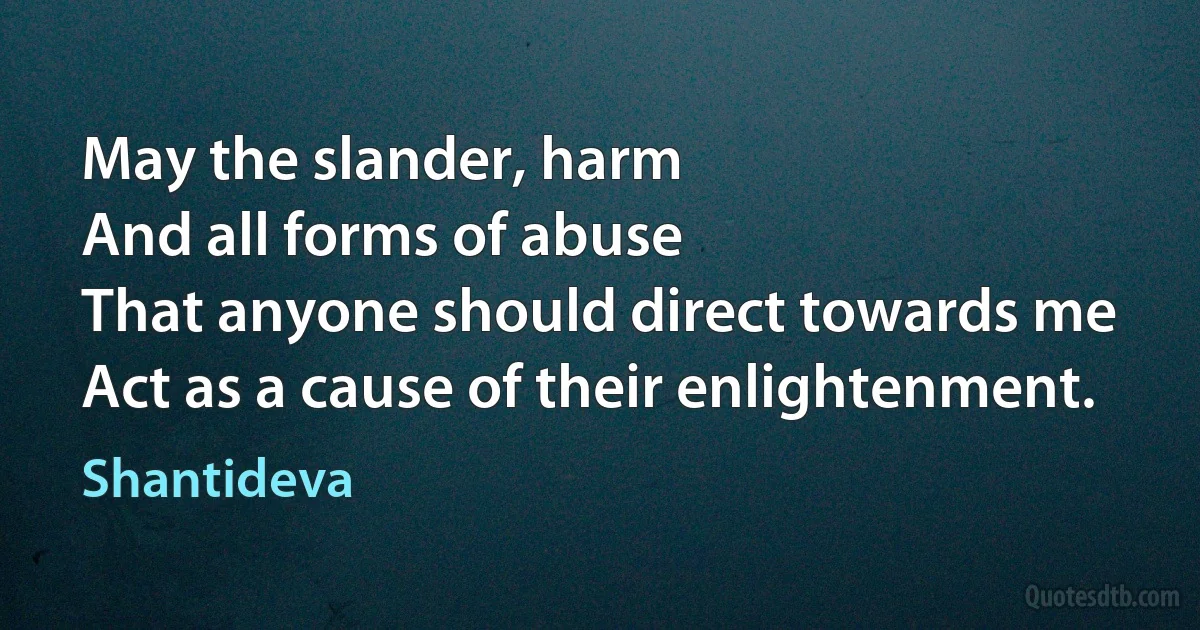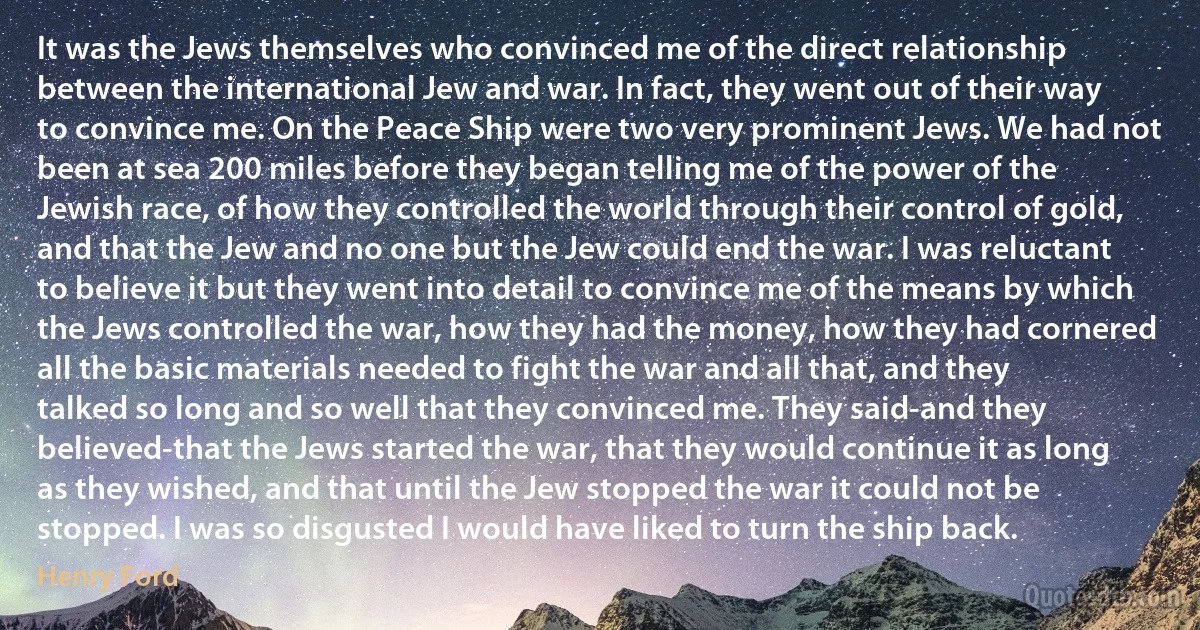Direct Quotes - page 65
The pressure of an all-powerful totalitarian state creates an emotional tension in its citizens that determines their acts. When people are divided into "loyalists" and "criminals" a premium is placed on every type of conformist, coward, and hireling; whereas among the "criminals" one finds a singularly high percentage of people who are direct, sincere, and true to themselves.

Czesław Miłosz
In any case God's act was the union of Mind with Matter by the same act or will which created both. No intermediate cause or condition intervened; no secondary influence had anything whatever to do with the result. Time had nothing to do with it. Every individual that has existed or shall exist was created by the same instantaneous act, for all time. "When the question regards the universal agent who produces beings and time, we cannot consider him as acting now and before, according to the succession of time." God emanated time, force, matter, mind, as he might emanate gravitation, not as a part of his substance but as an energy of his will, and maintains them in their activity by the same act, not by a new one. Every individual is a part of the direct act, not a secondary outcome.

Henry Adams
I shall, without further discussion of the other theories, attempt to contribute something towards the understanding and appreciation of the Utilitarian or Happiness theory, and towards such proof as it is susceptible of. It is evident that this cannot be proof in the ordinary and popular meaning of the term. Questions of ultimate ends are not amenable to direct proof. Whatever can be proved to be good, must be so by being shown to be a means to something admitted to be good without proof.

John Stuart Mill
The collective memory of every Latino people includes direct or indirect (neo-)colonialism, primarily by Spain or Portugal and later by the United States. Among Latinos, Mexicans in what we now call the Southwest have experienced US colonialism the longest and most directly, with Puerto Ricans not far behind.

Elizabeth Martinez
It constantly remains a source of disappointment to me that my drawings are not yet what I want them to be. The difficulties are indeed numerous and great, and cannot be overcome at once. To make progress is a kind of miner's work; it doesn't advance as quickly as one would like, and as others also expect, but as one stands before such a task, the basic necessities are patience and faithfulness. In fact, I do not think much about the difficulties, because if one thought of them too much one would get stunned or disturbed.
A weaver who has to direct and to interweave a great many little threads has no time to philosophize about it, but rather he is so absorbed in his work that he doesn't think but acts, and he feels how things must go more than he can explain it. Even though neither you nor I, in talking together, would come to any definite plans, etc., perhaps we might mutually strengthen that feeling that something is ripening within us. And that is what I should like.

Vincent van Gogh
...We Chicana/o authors are naturally drawn to concentrate on the challenges and issues that confront our society, which in turn are different from those that our Latin American colleagues face. I really think that we, on this side of the border, tend to be more direct and frank; perhaps some of us might be considered more audacious and blunt. And I believe this comes to us as a result of being brought up in the U.S., where we're taught to be outspoken. Where a Latin American author circumvents or evades, a Chicana/o aims straight at the heart of the issue without mincing words.

Graciela Limón
Many of the famed New York intellectuals of the 1930s and 1940s who later shaped neoconservatism, including Norman Podhoretz, Nathan Glazer, and Irving Kristol, were either immigrants or first-generation Americans whose families had direct experience with the totalitarian movements then wracking Europe.

Paul D. Miller (academic)
A lot of people talk about the Israeli lobby, and think that Israel is behind a lot of this. But I've studied it up close... Rather than Israel dictating policy to the United States, a cabal of neoconservatives have used the Israeli lobby as a facilitator. If this was all about Israel dictating policy, we'd have skipped Iraq and gone straight to Iran... The big picture in the Middle East is China... It's about leveraging control over Middle-Eastern and central-Asian oil, in order to dictate the pace of China's economic growth over the next 30 years. Because China's the biggest threat in the eyes of the neoconservatives... that's going to threaten American global economic hegemony... You deal with China indirectly at this point in time because you don't want direct confrontation.

Scott Ritter
About 1932 one of Sapir's students at Yale, Benjamin Lee Whorf drew on Sapir's ideas and began an intensive study of the language of the Hopi Indians of Arizona. Whorf's brilliant analysis... seemed to support the view that man is a prisoner of his language. Whorf emphasized grammar-rather than vocabulary, which had previously intrigued scholars-as an indicator of the way a language can direct a speaker into certain habits of thought.

Peter Farb
Circumstances have been such, that I have lived almost entirely secluded for some time. Those who are much in earnest and with single minds devoted to any great object in life, must find this occasionally inevitable.... You will wonder at having heard nothing from me; but you have experience and candour enough to perceive and know that God has not given to us (in this state of existence) more than very limited powers of expression of one's ideas and feelings... I shall be very desirous of again seeing you. You know what that means from me, and that it is no form, but the simple expression and result of the respect and attraction I feel for a mind that ventures to read direct in God's own book, and not merely thro' man's translation of that same vast and mighty work.

Ada Lovelace
Carlson is comfortably familiar. He's one of us, an entertaining companion at lunch, full of gossip and wit and even ideas. At the same time, over the years, he has become radically unfamiliar. There are not many journalists or other people regarded as public intellectuals who are promoters of Trump and Trumpism, and who share the president's fluency in insult and indignation. It is the composite nature of Carlson's character-belonging at once to two divergent worlds-that makes him interesting to fellow journalists in a way that, say, Sean Hannity, with a larger audience and more direct influence with Trump, generally is not. Many colleagues once viewed him as an important voice of the intelligentsia. Many now believe he has joined the dumbgentsia. They wonder, as Columbia Journalism Review put it, "What happened to Tucker Carlson?”.

Tucker Carlson
It might be thought that the I Ching and the oracles are metaphysical while the computer model is "real"; but the fact remains that a machine to foretell the future is based on metaphysical assumptions of a very definite kind. It is based on the implicit assumption that "the future is already here," that it exists already in a determinate form, that it requires merely good instruments and good techniques to get it into focus and make it visible. The reader will agree that this is a very far-reaching metaphysical assumption which seems to go against all direct personal experience.

E. F. Schumacher
I cannot claim to have had any direct personal divine inspiration. Yet coping with multitudinous problem-solving efforts and observing the world in which I live evokes an openness to a mystery of being that I cannot deny. Critical reflection leads me to believe than an awareness of such mysteries is a necessity in the constitution of order in democratic societies. If religion is a necessity in the conceptualization of paradigmatically diverse formulations, religion might be viewed as a necessary element in a system of knowledge pertaining to the consitution of order. We do, however, face the problem of those system of order that were constituted under circumstances of explicitly rejecting religion as a necessary feature in their constitution. We have the potential, then, of those who reject religion becoming the prophets of new secular religions. What we call "ideologies" may be the source of that most profound pathologies in human personal and social disorders.

Vincent Ostrom
We live in a country where the people own the Government and not in a country where the Government owns the people. Thought is free, speech is free, religion is free, no one can say that the Press is not free. In short, we live in a liberal society, the direct product of the great advances in human dignity, stature and well-being which will ever be the glory of the nineteenth century.

Winston Churchill
The consistent anarchist, then, should be a socialist, but a socialist of a particular sort. He will not only oppose alienated and specialized labor and look forward to the appropriation of capital by the whole body of workers, but he will also insist that this appropriation be direct, not exercised by some elite force acting in the name of the proletariat.

Noam Chomsky
The means that were used were extensive. For example, there was a good deal of fabrication of atrocities by the Huns, Belgian babies with their arms torn off, all sorts of awful things that you still read in history books. Much of it was invented by the British propaganda ministry, whose own commitment at the time, as they put it in their secret deliberations, was "to direct the thought of most of the world." But more crucially they wanted to control the thought of the more intelligent members of the community in the United States, who would then disseminate the propaganda that they were concocting and convert the pacifistic country to wartime hysteria. That worked. It worked very well.

Noam Chomsky
The Report calls for direct talks for Palestinians who "accept Israel's right to exist" (an absurd demand) but does not restrict Israelis to those who accept the right of a Palestinian state to exist, which would, for example, exclude Israel's Prime Minister Olmert, who received a rousing ovation in Congress when he declared that Israel's historic right to the land from Jordan to the sea is beyond question.

Noam Chomsky
The worker becomes all the poorer the more wealth he produces, the more his production increases in power and range. The worker becomes an ever cheaper commodity the more commodities he creates. With the increasing value of the world of things proceeds in direct proportion the devaluation of the world of men. Labour produces not only commodities; it produces itself and the worker as a commodity - and does so in the proportion in which it produces commodities generally.

Karl Marx



